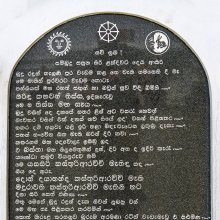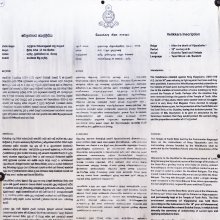Vasi, Vaśī, Vāsin, Vasin, Vaśin, Vashin, Vāśī, Vāśi, Vāsi, Vaśi, Vashi: 36 definitions
Introduction:
Vasi means something in Buddhism, Pali, Hinduism, Sanskrit, Jainism, Prakrit, Marathi, Hindi, biology. If you want to know the exact meaning, history, etymology or English translation of this term then check out the descriptions on this page. Add your comment or reference to a book if you want to contribute to this summary article.
Vasi has 35 English definitions available.
The Sanskrit terms Vaśī and Vaśin and Vāśī and Vāśi and Vaśi can be transliterated into English as Vasi or Vashi or Vasin or Vashin, using the IAST transliteration scheme (?).
Images (photo gallery)
Languages of India and abroad
Sanskrit dictionary
[Deutsch Wörterbuch]
Source: Cologne Digital Sanskrit Dictionaries: Böhtlingk and Roth Grosses Petersburger WörterbuchVaśi (वशि):—
1) oxyt. adj. [Vājasaneyisaṃhitā 28, 33] nach [Mahīdhara] = kānta . —
2) n. = vaśitva [Śabdamālā im Śabdakalpadruma]
--- OR ---
Vaśī (वशी):—(von vaś) s. urvaśī .
--- OR ---
Vasi (वसि):—(von 3. vas) [Uṇādisūtra 4, 139.] = vastra Gewand [UJJVAL.]
--- OR ---
Vāśi (वाशि):—[Uṇādisūtra 4, 124.] m. = agni [UJJVAL.]
--- OR ---
Vāśī (वाशी):—
--- OR ---
Vāsi (वासि):—s. u. vāśī 1).
--- OR ---
Vāsī (वासी):—s. u. vāśī 1).
Source: Cologne Digital Sanskrit Dictionaries: Böhtlingk and Roth Grosses Petersburger WörterbuchVaśin (वशिन्):—
--- OR ---
Vasin (वसिन्):—(von vasā) m. Fischotter [Hemacandra’s Abhidhānacintāmaṇi 1350.]
--- OR ---
Vāśin (वाशिन्):—(von vāś) adj. heulend, krächzend u. s. w.: maṇḍalaiḥ kākagṛdhrāṇāmākīrṇo rukṣavāsibhiḥ (lies rūkṣavāśibhiḥ) [KĀM. NĪTIS. 16, 26.] — Vgl. kāka, ghora .
--- OR ---
Vāsin (वासिन्):—1. (von 3. vas) adj. am Ende eines comp. gekleidet: kṛṣṇaśa schwärzlich gekleidet [Aitareyabrāhmaṇa 5, 14.] pāṇḍara [Mahābhārata 1, 146.] nīla (so ist statt līna zu lesen) [Rāmāyaṇa Gorresio 2, 8, 43.] malina [19.] rauravājina [Mahābhārata 1, 7124.] kauśeya [Rāmāyaṇa 2, 37, 9.] pītakauśeya [Rāmāyaṇa Gorresio 2, 37, 9. 3, 52, 19. 25. 5, 31, 2.] raktakauśeya [Mahābhārata 1, 7980.] mahārhakṣauma [Rāmāyaṇa 5, 2, 16.] cīrakāṣāya [Mahābhārata 3, 8588.] kāṣāya [Harivaṃśa 6942.] cīra [Rāmāyaṇa 2, 38, 12.] dhautodgamanīya [Daśakumāracarita 63, 12.] — Vgl. ajina, rakta (auch [Rāmāyaṇa 5, 27, 17]).
--- OR ---
Vāsin (वासिन्):—2. (von 5. vas) adj. verweilend, sich aufhaltend, wohnend, lebend (an einem Orte): tatra [Rāmāyaṇa 1, 25, 21.] samānatīrthe (nach [Pāṇini’s acht Bücher 6, 3, 18] comp.) [Pāṇini’s acht Bücher 4, 4, 108.] in comp. mit dem Orte [Hemacandra’s Abhidhānacintāmaṇi 10.] āvasatha [The Śatapathabrāhmaṇa 12, 4, 4, 6.] ācāryakula [Chāndogyopaniṣad 2, 23, 1.] pātālatala [Mahābhārata 1, 1132.] samudra [7659.] ayodhyā [3, 2766.] bāhya [13, 2572.] viṣaya [Rāmāyaṇa 1, 7, 8. 2, 25, 21.] tvattīravāsīni (so die ed. Bomb.) daivatāni [52, 84.] [Raghuvaṃśa 15, 61.] [Kumārasaṃbhava 5, 25.] [Śākuntala 61, 7.] [Varāhamihira’s Bṛhajjātaka S. 101, 9.] [Kathāsaritsāgara 25, 57. 61, 4.] [Rājataraṅgiṇī 3, 413] (vāsī mit der ed. Calc. zu lesen). [Spr. 4131.] [Prabodhacandrodaja 53,8.] [Mārkāṇḍeyapurāṇa 46,40. 76,25.] [PAÑCAR.2,4,7. 51.4,8,38. fg.] [ŚUK.] in [Lassen’s Anthologie (III) 37,2.] [ŚAṂKARAJAYA ebend. 87,21.] [Oxforder Handschriften 70,b,12.] [Pañcatantra 129,14.] tadvṛkṣavāsinaḥ pakṣiṇaḥ [Hitopadeśa 18, 8.] bhūtānāṃ dhvajavāsinām [Mahābhārata 4, 1526. 5, 3701.] bhramaraiḥ sragdāmāsaktavāsibhiḥ [Harivaṃśa 8372.] bhramara unter Bienen [Rājataraṅgiṇī 3, 394. 423.] channa verborgen [Mahābhārata 4, 893.] saṃvatsara ein Jahr lang bleibend [The Śatapathabrāhmaṇa 14, 1, 1, 27.] kalpa einen Kalpa bestehend [Bhāgavatapurāṇa 4, 9, 20.] brahmacāri als Brahmanenschüler lebend [Taittirīyasaṃhitā 6, 3, 10, 5.] — Vgl. anta, ante, ambu, araṇya, āśrama (auch [Rāmāyaṇa 1, 4, 3.] [Śākuntala 8, 13. fg. 16]), kāntāra, kāma, kāmpīla, kośa, kṣīṇa, khadūra, kharva, giri, gṛhe, grāma, grāme, catvara, jala, parvata, pura (auch [Rāmāyaṇa Gorresio 2, 13, 29. 4, 9, 6]). prativeśa, bila, bile, madya, malaya, mahāvihāra (unter mahāvihāra), vana, sāmanta, suvāsinī, svavāsinī .
--- OR ---
Vāsin (वासिन्):—3. (von 3. vāsa)
1) adj. schön duftend. —
2) vāsinī f. eine weiss blühende Barleria (śuklajhiṇṭī) [Śabdacandrikā im Śabdakalpadruma]
--- OR ---
Vāsin (वासिन्):—4. ungenaue Schreibart für vāśin in rūkṣa [KĀM. NĪTIS. 16, 26.] — Vgl. vasta .
Sanskrit, also spelled संस्कृतम् (saṃskṛtam), is an ancient language of India commonly seen as the grandmother of the Indo-European language family (even English!). Closely allied with Prakrit and Pali, Sanskrit is more exhaustive in both grammar and terms and has the most extensive collection of literature in the world, greatly surpassing its sister-languages Greek and Latin.
See also (Relevant definitions)
Starts with (+186): Vaci, Vacikakarakan, Vacikam, Vacikan, Vacikantam, Vacikapattiram, Vacikaracakti, Vacikaram, Vacikaramaruntu, Vacikaran, Vacikaranam, Vacikari, Vacikarippu, Vacikatitcai, Vacikkal, Vacilinkaru, Vacimetam, Vacini, Vacippu, Vacipu.
Ends with (+253): Acaravaci, Adhivasi, Adivasi, Aganivasi, Agraravasi, Ahivasi, Ajjhavasi, Aluvasi, Amavasi, Ambalavasi, Ambavashi, Ambuvasi, Ampalavaci, Amparavaci, Amtarvasi, Amtevasi, Anavaci, Anavishvasi, Andhavishvasi, Anivasi.
Full-text (+324): Vasibhuta, Vanavasin, Samantavasin, Bastavashin, Antavasin, Amavasi, Vasika, Vasita, Ghorarasin, Bastabhivashin, Vashiprapta, Parvatavasin, Vashiman, Avasin, Kshinavasin, Vashikrita, Vashikarana, Vasibhava, Antevasi, Antevasin.
Relevant text
Search found 64 books and stories containing Vasi, Vaśī, Vāsin, Vasin, Vaśin, Vashin, Vāśī, Vāśi, Vāsi, Vaśi, Vashi, Vasī, Vāsī, Vāśin; (plurals include: Vasis, Vaśīs, Vāsins, Vasins, Vaśins, Vashins, Vāśīs, Vāśis, Vāsis, Vaśis, Vashis, Vasīs, Vāsīs, Vāśins). You can also click to the full overview containing English textual excerpts. Below are direct links for the most relevant articles:
Brihad Bhagavatamrita (commentary) (by Śrī Śrīmad Bhaktivedānta Nārāyana Gosvāmī Mahārāja)
Verse 1.6.45 < [Chapter 6 - Priyatama (the most beloved devotees)]
Verse 1.6.84 < [Chapter 6 - Priyatama (the most beloved devotees)]
Verse 1.7.90-91 < [Chapter 7 - Pūrṇa (pinnacle of excellent devotees)]
Katha Upanishad with Shankara’s Commentary (by S. Sitarama Sastri)
Verse 2.2.12 < [Adyaya II, Valli II - The soul after death]
Rig Veda (translation and commentary) (by H. H. Wilson)
Warfare and Military System in Vedic Literature (by Rinki Deka)
Arms and Armours < [Chapter 2 - Military System as Revealed in the Vedic Texts]
A Survey of Paramattha Dhammas (by Sujin Boriharnwanaket)
Part 4 - The Development Of Samatha
Chapter 5 - The Three Attainments < [Part 5 - The Development Of Insight]
Chapter 4 - The Three Kinds Of Full Understanding < [Part 5 - The Development Of Insight]


